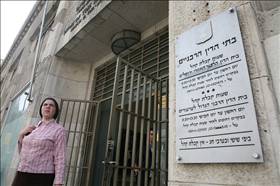Human Rights And The Supreme Court
Israel has never had a constitution and has relied on its Declaration of Independence and judges to maintain equality
29/05/2011 13:04
Tags: Israel · laws · supreme court

religious court
A gap remains between religious law and human rights. Indeed, while religious Justice Elon and secular Justice Barak agree that equality should prevail over religious law and traditional Jewish practices, they disagree as to whether distinction based on sex could be allowed in other matters. Justice Elon posits that “discrimination on legal-religious grounds is allowed in the case of legal prohibition and approval pertaining to matters of marriage and divorce…” whereas Justice Barak does not concur. This is not an insignificant matter as it goes to the heart of the relationship between the civil and religious laws in Israel. This issue is further complicated given the long-standing status accorded to the religious courts in the domain of family law and the explicit exemption granted by the legislature to religious law in this domain, as, for example, in article 5 of Women’s Equal Rights Law (1951), which stipulates that the law itself cannot impair religious laws of marriage and divorce. Similarly, article 10 of “Basic Law: Human Dignity and Liberty” (1992) provides protection to the validity of laws – including religious laws – that existed prior to the commencement of the basic law.
Soon after the enactment of “Basic Law: Human Dignity and Liberty,” the Supreme Court heard an appeal by Hava Bavli who argued that upon her divorce she was deprived of her property and financial rights by the religious courts. Her appeals were previously turned down twice by the religious courts and once by the District Court on the grounds that it has no jurisdiction over the decision of the religious courts. In a groundbreaking decision, the Supreme Court declared the decision null and void on the grounds of unreasonableness and returned the mater to the religious court. The Supreme Court also ruled that the Equal Rights of Women Law applies to the decisions of the religious courts, despite the explicit order in the law that says it is inapplicable to matters of marriage and divorce (article 5). The religious courts were instructed to respect, protect and apply the principle of equal division of marital property even if it was not guaranteed according to Jewish Law (Halacha) (Kremnitzer 2001: 116-118). While this principle is important, the religious courts have been often slow to adjust themselves to the new directives of the secular courts (Scolnicov 2006).
To read the entire paper by Doron Shultziner go to Jewish Virtual Library Publications